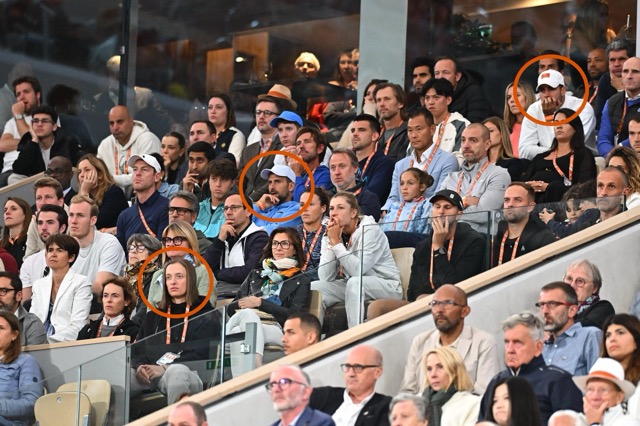You couldn’t have asked for a worse first-round opponent for Rafael Nadal at this year’s Roland-Garros than Alexander Zverev, and Zverev’s recent Rome title has nothing to do with it: theirs is a mismatch of character, not styles of play. The odds favored Nadal losing early regardless of his opponent; with all his absences from the tour over the last couple years, he’s rustier than the bailing wire that gave Ma Ingalls tetanus.*
Though he declined to confirm this was his final French Open, preferring to focus on preparations for the upcoming Olympics, it’s hard to picture an alternate scenario. Had he faced Carlos Alcaraz instead of Zverev, one potential matchup, it would’ve been too perfect, the line-of-succession headlines writing themselves. Instead we got Goofus and Gallant.
I won’t soon forget this striking image of a murderers’ row of tennis champions in attendance today. A disproportionate number of active and recently retired players were represented in the stands, a phenomenon rarely if ever witnessed in the first round of a Slam. The three most recognizable figures from that cohort — Alcaraz, Djokovic and Świątek — were seated in the same section and often appeared to be lost in thought.

There was, somewhat adorably, the earnest, puppy-dog sadness of Nadal’s compatriot Alcaraz, who, like his father behind him, kept putting his head in his hands. Less moving but just as understandable after the season he’s had so far — and the speculation it has engendered — was Djokovic’s pensiveness. But it was the stony-faced Świątek whose expression I found most relatable, because I suspect that unlike Novak and Carlitos, who are pals with Zverev, she knew that more than tennis was at stake.
Tournament workers, from office staff to stringers, universally laud Nadal for his impeccable manners; Zverev curses at ball kids and swats at chair umpires (with his racquet) in anger. Nadal is a player so family-oriented that when his parents split up in his twenties, he was in a visible fog for several months. He’s been with his wife for over half his life and didn’t become a father until the end of his career was in sight, presumably so he would have more time for his son.** Zverev’s a girlfriend-beater who has nothing to do with the daughter he fathered by one of his accusers.
“I would like to be remembered as a good person,” Rafa has said in interviews, and we have no reason to doubt that will remain the most important part of his legacy. Zverev might’ve bested him on the court, but there’s a lot the man from Mallorca could teach him.
* We’re coming up on a year since the Parkinson’s guillotine dropped and it might be time to write a post explaining Little House on the Prairie’s trivial connection to that day.
** Federer, Djokovic and Murray have also been with their wives since they were teens; domestic stability seemed to be an essential component of their professional success. That was particularly obvious with Djokovic, whose career often dipped during periods of rumored stress in his marriage (and, most memorably, when his brother got him mixed up with a cult that naturally denies it’s a cult).